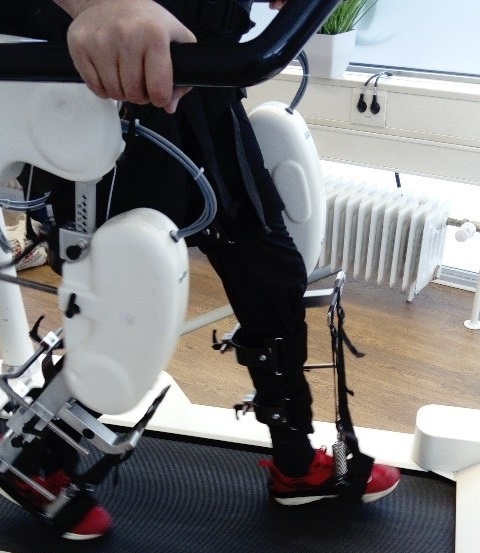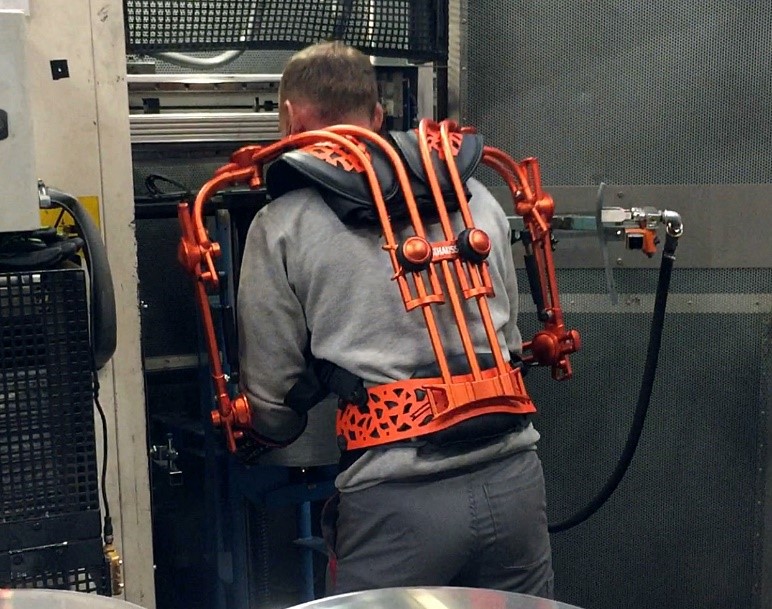DFG-Project: Deviant Bodies. Extended Bodies

The aim of the present project is to inquire into the transformation of the human body by means of such biotechnologies as exoskeletons. This shall be observed both in rehabilitative environment, as well as non-rehabilitative environment (industry; military field). An "exoskeleton is an electromechanical structure worn by operator and matching the shape and functions of human body. It is able to augment the ability of human limb and/or to treat muscles, joints, or skeletal parts which are weak, ineffective or injured because of a disease or a neurological condition. […] The exoskeleton works mechanically in parallel with human body and can be actuated passively and or actively" (Anam/Al-Jumaily 2012: 988).
One of the areas which reinforced the visibility and importance of the body as a topic of social research is that of disability studies (Barnes/Mercer 2003; Waldschmidt/Schneider 2007). Disability has often been conceived as a form of deviance from a standard health model and associated with impairment (Goodley 2011: 5). The development of medical technologies reinforced this conception of a body in need of normalization, biotechnologies being particularly elucidating in such a context (Sharon 2014). However, such technological advancements bring a double challenge: first they reinforce the status of disability qua deviance in respect to a health norm; second, their applications may go over rehabilitation purposes. As already shown by promoters of the “transhumanist” paradigm (Bostrom/Savulescu 2009; Kurzweil 2006), biotechnologies modify parameters of the human body and advance a model for an enhanced body, leading to a reinvention of corporeal limits.

This research inquires into the transformation and categorical redefinition of the "deviant" body and its correlation to an "extended" body while examining motility impairments such as cerebral palsy, spinal cord injury and cerebrovascular accidents, and experiences of healthy persons active in industrial and military field.
The above mentioned terminological association questions the transition of a bodily deviance conceived in medical terms and mostly negatively (Goffman 1963), to a form of deviance produced by means of biotechnological applications, and conceived positively as augmentation.
From a theoretical point of view, the phenomenological perspective on body and embodiment (Husserl [1928] 1973; Merleau-Ponty 2012; Gallagher 2005; Crossley 2001) is used. If the phenomenological tradition of the body is present in various sociological projects (Crossley 2001; Gugutzer 2002, 2012), the consideration of such categories as "deviant" or "extended" body in relation to biotechnology was less addressed. The originality of the planned project resides in its interest in the production of these categories, questioning the pertinence of classical phenomenological concepts such as “own body” (Leib) or “objective body” (Körper). The theoretical background shall be correlated to data obtained from qualitative fieldwork, namely expert interviews, narrative interviews and participant observation in laboratories and centers where exoskeletons are tested and used.
Research Outputs
- Habilitation Thesis
Deviant Bodies. Extended Bodies. How Exoskeletal Devices Reshape Corporealities and Their Phenomenologies in Social Contexts. 423 p.
Thesis submitted on 07.07.2021. Defense on 15.12.2021, University of Konstanz, Venia legendi: sociology.
- Monograph
Butnaru D. (2023): Exoskeletal Devices and the Body: Deviant Bodies, Extended Bodies. London: Routledge. https://www.routledge.com/9781032503769
- Peer-Reviewed Articles and Book Chapters:
Among Bodies and Machines: ‘Epistemological Vulnerability’ with Exoskeletons. Careful Engagements. D. Lydhal and N. C. Nickelsen (Eds.). Wiesbaden: Springer (forthcoming 2023).
Temporarily Abled: How Exoskeleton Experience Reinvents Corporeality in Spinal Cord Injury and Cerebrovascular Accidents. NanoEthics. Special Issue Manufacturing Life. Sahinol M. and Compagna D. (Eds.) (forthcoming 2022).
Simulating the Healthy Body: How Exoskeletal Devices Invent New Forms of Capability in Rehabilitative Environment. Conference Proceedings of the STS Conference Graz 2021. Critical Issues in Science, Technology and Society Studies. Verlag der TU Graz 2021, 89-108. DOI: 10.3217/978-3-85125-855-4-05
Exoskeletons, Rehabilitation and Bodily Capacities. Body&Society. Vol 27 (3) 28-57. https://journals.sagepub.com/doi/10.1177/1357034X211025600
Talks:
- Invited Talks:
1. Rehabilitating bodies: exoskeletal devices and their promise of techno-corporeal phenomenologies. KAIST, Rep. of Korea. 23.09.2021.
2. Exoskeletal devices in a rehabilitative environment and their challenges in the production of a hybrid intentionality. Exo Berlin. 22-23.10.2018.
3. Redesigning bodies: how technology contributes to new phenomenologies of vulnerability. Workshop: Phenomenology of Changing Life-Worlds. Exploring Human-Machine Interaction. Universität Konstanz. 23-24.07.2018.
- Peer-Reviewed Talks:
4. Aiming for certainty. Corporeal surprises in body work with exoskeletons. Panel 121. Mass-Produced Uncertainties. Meeting of the Society for the Social Studies of Science. 06-09.10.2021.
5. Technological corporeal worlds with exoskeletal devices. Panel 50. Critical Augmented Reality Studies: Newly Material Forms of Digital Formations of Identity, Surveillance and Publics. Meeting of the Society for the Social Studies of Science. 06-09.10.2021.
6. Reinventing ability. Constructions of “sense(s) of agency” with exoskeletal devices in spinal cord injury and stroke. Conference: 8th STS Italia Conference. Track 5. Disentangling Technoscience and Sensory Experience. 17-19.06.2021.
7. Simulating the healthy body: how exoskeletal devices invent new forms of capability in rehabilitative environment. STS Conference “Critical Issues in Science, Technology and Society Studies”. Session B8: Robots and the (Dis)simulation of the Human World. Graz. 03-05.05.2021.
8. Re-skilling able bodies with exoskeletons and the invention of current phenomenological socio-materialities in working contexts. Conference: Palimpsest in Practice: Reimagining Time, Narrative, Movement. Anthropology in Transit. UC Irvine. 09-11.04.2021.
9. Embodying the machine: “epistemological vulnerability” following fieldwork experiences with exoskeletons. Annual conference of the Association of Social Anthropologists (UK). Panel After Fieldwork. 29.03.-02.04.2021.
10. Aiming at the ‘proper’ body: therapeutic challenges with exoskeletal devices. Panel 75. Health Made Digital. EASST/ 4S Conference. 18-21.08.2020.
11. Experts of the body: body-building in training with rehabilitative exoskeletal devices. Conference: Future Health and New Technologies: Opportunities and Responsibilities. HELEX. Keble College, Oxford University. 21-23.07.2020 (cancelled due to Covid19 pandemic).
12. Body work: the production of new grammars of the body in spinal cord injury (SCI) and stroke (CVA) due to the use of exoskeletal devices in rehabilitation. Conference: Exoskeletons and Wearable Robots: Current Practice and Future Perspectives. Bilbao. 23-24.04.2020 (reported due to Covid19 pandemic).
13. De-situierte Körper: Wie exoskeletale Vorrichtungen somatische Wissensbestände umgestalten. Kongress der österreichschen Gesellschaft für Soziologie. Salzburg. 25-28.09.2019.
14. Bodies improved? Bodies repaired? Reinventing one’s “own body” due to exoskeleton use. Symposium Optimization. Odense. 12-13.09.2019.
15. Re-appropriating autonomy: from objective bodies to subjective bodies. Conference: Appropriating technologies. The political economy and routinization of artefacts and devices. Copenhagen. 24-25.09.2018.
16. Bodies and their stories. Conference: Narrative Matters. Enschede. 2-6.07.2018.
17. Bionic bodies: challenging disability, challenging ability? Conference: Phenomenology of Medicine and Bioethics. Stockholm. 13-15. 06.2018.
18. Das “Ich kann” erfinden: Wie Bewegungsdysfunktionen neue Körper gestalten. Conference: „Ungeahnte Unfähigkeiten“, Mainz. 17-18.05.2018.
- Other Talks:
19. Deviant Bodies. Extended Bodies (project presentation). CIFAS Summer School in Ethnographic Methods. Columbia University. USA. 20-31.07.2020.
20. Deviant Bodies. Extended Bodies (project presentation). ETH Zürich. 21.02.2019.
